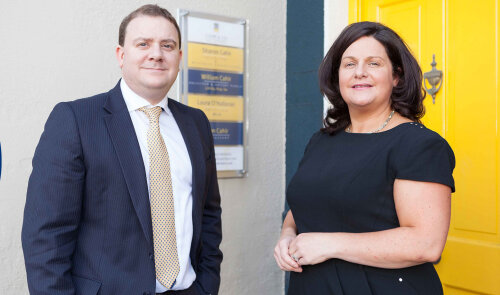Best Medical Malpractice Lawyers in Ennis
Share your needs with us, get contacted by law firms.
Free. Takes 2 min.
List of the best lawyers in Ennis, Ireland
About Medical Malpractice Law in Ennis, Ireland
Medical malpractice - also called clinical negligence - arises when a healthcare professional or organisation fails to provide care at a reasonable standard and that failure causes injury or loss. In Ennis, as across Ireland, medical malpractice claims can involve general practitioners, hospital doctors, nurses, midwives, dentists, physiotherapists and hospitals - both public and private. Claims may focus on misdiagnosis, delayed diagnosis, surgical errors, medication mistakes, birth injuries and failures in follow-up or continuity of care.
Legal claims for clinical negligence are civil claims in which the injured person seeks compensation for the harm suffered. These claims are governed by Irish civil law and are influenced by medical standards, expert evidence and statutory procedures that apply across the State.
Why You May Need a Lawyer
You may need a lawyer if you believe you or a family member suffered harm because of negligent medical care. Common situations where legal help is needed include:
- Serious or long-term injury after treatment, surgery or childbirth.
- Death of a loved one linked to possible negligent care.
- Significant worsening of a medical condition due to delayed diagnosis or incorrect treatment.
- Repeated errors or failures to follow up that caused harm.
- Problems obtaining or interpreting medical records, or dealing with hospitals and insurers.
A lawyer with clinical negligence experience can assess whether you have a viable claim, help secure and review medical records, instruct medical experts, advise on limitation periods and the likely value of a case, and represent you in negotiations or court.
Local Laws Overview
Key legal points to know for medical malpractice claims in Ennis and Ireland generally:
- Negligence basics - To bring a claim you must show that a duty of care existed, that the duty was breached by failing to meet the required standard, and that the breach caused the injury and loss.
- Standard of proof - Civil claims use the balance of probabilities test - meaning it is more likely than not that the negligent act or omission caused the harm.
- Time limits - There are strict limitation periods for personal injury claims in Ireland. Generally you should seek advice as soon as possible. In most cases a claim must be brought within two years from the date of knowledge of the injury or the date the injury occurred. There are exceptions in cases involving children or where the injury was discovered later.
- Public versus private providers - Claims against public hospitals and the Health Service Executive are usually handled through the State Claims Agency, which manages clinical negligence claims for the State. Claims against private practitioners or private hospitals are usually pursued against the practitioner or their insurer.
- Courts and jurisdiction - Clinical negligence actions are civil court proceedings. More serious or high-value cases are commonly taken in the High Court, though other courts may have jurisdiction depending on the value and nature of the claim.
- Expert evidence - Medical expert reports are almost always required to establish the clinical standard of care and causation. Experts will be asked to compare the treatment given with accepted professional standards.
- Complaint and regulatory processes - You can complain to the treating provider, to the Health Service Executive for public care, or make a complaint to professional regulators such as the Medical Council or the Nursing and Midwifery Board of Ireland. Those regulatory processes are separate from civil actions for compensation.
Frequently Asked Questions
What counts as medical malpractice in Ireland?
Medical malpractice occurs when a healthcare provider fails to provide the standard of care expected of a reasonably competent practitioner in the same circumstances, and that failure causes injury or loss. Examples include surgical mistakes, medication errors, delayed diagnosis, and failures during labour and delivery.
How long do I have to bring a claim?
Time limits are strict. Most personal injury and clinical negligence claims must be issued within two years from the date you knew, or ought to have known, about the injury and its possible medical cause. There are special rules for children and for situations where the injury is discovered much later. Obtain legal advice early so you do not lose your right to sue.
Do I need medical evidence to make a claim?
Yes. Clinical negligence claims usually rely on independent medical expert reports to show that care fell below the accepted standard and that this caused the injury. A solicitor will normally arrange expert opinions as part of assessing and progressing a case.
Can I complain without starting a legal claim?
Yes. You can make a complaint directly to the hospital, clinic or GP practice, or use the HSE complaints process for public services. You can also complain to professional regulators such as the Medical Council or the Nursing and Midwifery Board of Ireland. These complaints can result in investigations and recommendations, but they do not automatically give you compensation.
Who handles claims against public hospitals?
Claims against public hospitals and many State bodies are typically managed by the State Claims Agency. The Agency deals with investigations, settlement negotiations and litigation for clinical negligence involving State-funded services.
How long will a claim take to resolve?
Timelines vary widely. Some claims are resolved by settlement within months, while more complex cases can take several years, especially if the claim goes to court. The need for expert reports, medical assessments and court timetables all affect progress.
How much does it cost to hire a medical negligence solicitor?
Costs depend on the solicitor and the case. Some firms offer fixed-fee initial consultations, conditional fee agreements or contingency arrangements for certain cases, while others charge on an hourly or percentage basis. Always discuss fees, disbursements and the risk of adverse costs up front. If you have legal expenses insurance, it may cover costs.
How is compensation calculated?
Compensation generally covers pain and suffering, loss of earnings, future care needs, and other financial losses caused by the injury. The amount depends on the severity of injury, prognosis, impact on life and work, and comparable awards in previous cases. A solicitor or barrister can give an estimate after reviewing the facts and expert evidence.
Can a relative bring a claim if the injured person cannot?
Yes. If a person lacks capacity, a next friend or legal guardian may bring a claim on their behalf. In the event of death, certain relatives may bring a dependency or wrongful death action. Specific rules and time limits apply, so seek legal advice promptly.
How do I get my medical records?
You have a right to access your personal health information. Request your records from the hospital, clinic or GP practice in writing. Public bodies are also subject to data protection rules, including the right of access under relevant privacy legislation. Keep copies of your requests and any responses.
Additional Resources
Useful organisations and bodies that can help or provide information:
- State Claims Agency - manages clinical negligence claims involving public health services.
- Health Service Executive - HSE complaints and patient liaison services for public healthcare concerns.
- Medical Council - the statutory regulator for doctors in Ireland.
- Nursing and Midwifery Board of Ireland - regulator for nurses and midwives.
- Office of the Ombudsman - handles complaints about public bodies including the HSE.
- Citizens Information - general information on rights, procedures and access to services.
- Legal Aid Board - information on legal aid and eligibility for civil matters.
- Data Protection Commission - for issues about access to personal medical data.
Next Steps
If you think you have experienced medical malpractice, consider the following steps:
- Seek immediate medical attention if you need care.
- Keep detailed records - dates, names of staff, what happened and how it affected you.
- Request and retain copies of your medical records from the healthcare provider.
- Consider making a formal complaint to the provider or to the HSE if care was in a public facility.
- Contact a solicitor who specialises in medical negligence to discuss your case and time limits. Ask about fees, case funding and what to expect in terms of process and timescale.
- If you intend to pursue a claim, allow your solicitor to obtain independent medical reports to assess negligence and causation.
- Keep a file of all correspondence, bills and receipts for expenses related to the injury.
Remember that this guide provides general information only and does not replace legal advice tailored to your situation. Early legal advice will help protect deadlines and improve your chances of a satisfactory outcome.
Lawzana helps you find the best lawyers and law firms in Ennis through a curated and pre-screened list of qualified legal professionals. Our platform offers rankings and detailed profiles of attorneys and law firms, allowing you to compare based on practice areas, including Medical Malpractice, experience, and client feedback.
Each profile includes a description of the firm's areas of practice, client reviews, team members and partners, year of establishment, spoken languages, office locations, contact information, social media presence, and any published articles or resources. Most firms on our platform speak English and are experienced in both local and international legal matters.
Get a quote from top-rated law firms in Ennis, Ireland — quickly, securely, and without unnecessary hassle.
Disclaimer:
The information provided on this page is for general informational purposes only and does not constitute legal advice. While we strive to ensure the accuracy and relevance of the content, legal information may change over time, and interpretations of the law can vary. You should always consult with a qualified legal professional for advice specific to your situation.
We disclaim all liability for actions taken or not taken based on the content of this page. If you believe any information is incorrect or outdated, please contact us, and we will review and update it where appropriate.










